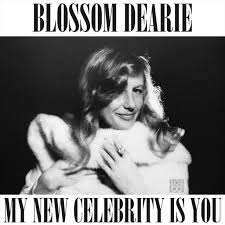
Blossom Dearie – My New Celebrity Is You
Blossom Dearie’s career has undergone a series of unusual and impressive steps. It started in the 40’s with her arrival in New York; local jazz aficionados recall her as the intermission pianist in a 52nd Street strip joint. A long residence in Paris followed in the 50’s where she was the guiding light of a provocatively jazzoriented singing group, the Blue Stars, and later a solo performer, a singer and pianist with a distinctive and imaginative repertory and a voice that managed to combine a little girl’s confidential whisper with an aura of sophistication. In recent years she has become, more and more, a self‐con tained operation—she writes many, if not most, of the songs she sings, publishes them herself and records them on her own label, Daffodil.
“My New Celebrity Is You” is a twodisk set that takes its title from a song Johnny Mercer wrote for Miss Dearie, patterned on the name‐dropping Christmas greetings that Frank Sullivan wrote for the The New Yorker and set in a catchy melody that adds to the complications of an exhaustingly tonguetwisting lyric. Miss Dearie steps neatly through its intricacies and moves on to a program of 15 more songs on which her own customary keyboard accompaniment is supplemented by swinging harmonica passages by Toots Thielemans and the warm sound of Hubert Laws’s flute.
Along with two of the classics of Miss Dearie’s repertory, Dave Frishberg’s super‐sybaritic “Peel Me a Grape” and a warning of the dangers attendant on hearing “The Pro Musica Antigua,” there are a haunting new bossa nova by Miss Dearie, “Inside a Silent Tear,” with evocative lyrics by one of her English collaborators, a woman who calls herself Arthur King, and “Unless It’s You,” a song by Johnny Mandel and Morgan Ames that brings out the warmest, more searching qualities of Miss Dearie’s voice.
Half the songs in the set are by Miss Dearie, which proves to be an overload since they include some of the least interesting, although the lack of interest comes less from Miss Dearie’s music than from the lyrics. But even these lesser efforts have such saving graces as Mr. Thielemans’s provocative harmonica solo on “Who Knows All the Answers?”
(Original New York Times review by John S. Wilson – June 2, 1977)














 The VOCAL SOUND OF JAZZ began airing on 89.5 FM (now WHRV-FM) on January 4th 1980. Originally a 30 minute program that aired on Friday evenings, the program expanded to it current 60 minute format and moved to Saturday evenings during the 90s. It was also aired over WUOM in Ann Arbor, Michigan for a five-year period in the late 1980s.
Produced and hosted by Jack Frieden since its premiere broadcast, the program has always attempted to spotlight both jazz vocal music’s post 1950s history, as well as the new singers and songs that will continue to play an increasingly prominent role in the music’s future. With the internet’s ability to attract and entertain jazz vocal fans globally, Jack looks forward to broadening the mission and reach of the “Vocal Sound of Jazz” in coming years.
Email Jack Frieden
Vocal Sound of Jazz LLC
1056 Downshire Chase
Virginia Beach, Va. 23452
Ph: 757 438 6785
The VOCAL SOUND OF JAZZ began airing on 89.5 FM (now WHRV-FM) on January 4th 1980. Originally a 30 minute program that aired on Friday evenings, the program expanded to it current 60 minute format and moved to Saturday evenings during the 90s. It was also aired over WUOM in Ann Arbor, Michigan for a five-year period in the late 1980s.
Produced and hosted by Jack Frieden since its premiere broadcast, the program has always attempted to spotlight both jazz vocal music’s post 1950s history, as well as the new singers and songs that will continue to play an increasingly prominent role in the music’s future. With the internet’s ability to attract and entertain jazz vocal fans globally, Jack looks forward to broadening the mission and reach of the “Vocal Sound of Jazz” in coming years.
Email Jack Frieden
Vocal Sound of Jazz LLC
1056 Downshire Chase
Virginia Beach, Va. 23452
Ph: 757 438 6785